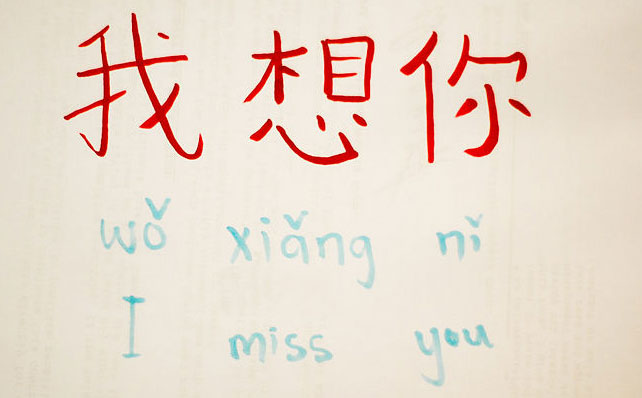How to say "I miss you" in Chinese
Posted by Fifi Yang 101661

How to say I miss you in Chinese?
wǒ xiǎnɡ nǐ le - 我想你了
Its literal meaning is almost identical to "I'm thinking about you." But there's a subtle grammatical difference: the final word 了le. Technically, it indicates a change of state: in Chinese, missing someone isn't just an action; it's a state of mind. If you just wanted to say that you were thinking about someone, you wouldn't include 了 (le).
You might remember 了 from other statements of mood, like
wǒ shēnɡ qì le - 我生气了 - I am angry.
wǒ shānɡ xīn le - 我伤心了 - I am sad
Each one indicates that the speaker's mood is in a new state.
In 我想你 wǒ xiǎnɡ nǐ, the function of 了 is the same.
As with other statements of mood, you can add intensifiers:
wǒ fēi chánɡ xiǎnɡ nǐ- 我非常想你 - I miss you so much
wǒ zhēn de hěn xiǎnɡ nǐ - 我真的很想你 - I really miss you.
and so on. And for people you don't miss because they never go away, you can say
wǒ bù xiǎnɡ nǐ - 我不想你! - I don't miss you
You can also ask whether someone misses you:
nǐ xiǎnɡ wǒ mɑ ? - 你想我吗 ? - Do you miss me?
Chinese language is profound. There are also other statements for I miss you. Here are some examples:
wǒ sī niàn nǐ- 我思念你 - I miss you.
This sentence means I miss you. We usually use it when two people are far away from each other. To express I think about you and miss you. 思念 (sī niàn) can also use as missing your hometown, friends or some abjects.
wǒ xiǎnɡ niàn nǐ - 我想念你 - I miss you.
想念(xiǎnɡ niàn) means miss, think about, be sick of. It is similar with 思念 (sī niàn). We use it when we miss something or someone we haven't seen for a long time or even we have no chance to see them again. Like a lost pet.
wǒ ɡuà niàn nǐ- 我挂念你 - I miss you.
挂念 (ɡuà niàn) means be concerned about, worry about or care about.
wǒ diàn jì nǐ - 我惦记你
惦记(diàn jì) means remember with concern; be concerned about; keep thinking about.
More Chinese phrases used in daily life:
Resources
- Daily Chinese
- Chinese Grammar and HSK Preparation
- Business Chinese
- Chinese for kids
- Pinyin and Chinese phonetics
- Chinese characters
- Chinese Idioms and culture
- AP Chinese
- General learning tips
- Conversational Video Course

Daily Chinese
This course is dedicated to build your oral communication skills. You will be placed in several role playing situations to give the training a "real world" feel. Gain valuable insight into conversational Mandarin in areas such as: taxi rides, ordering food, phone calls, looking for help and more.

Chinese for Young Learners
Interactive and fun Chinese course via games, video and songs, and discussing fun topics. Literacy focused curriculum to help teen students improve Chinese language proficiency as well as targeting school exams.










